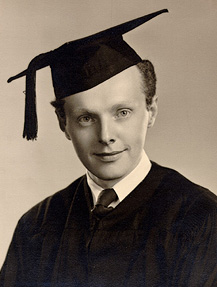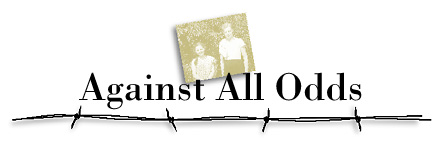Once the war was over, Lantos began his studies, first in medicine ("until they brought in the first corpse, and I was through with medical school"), then economics at the University of Budapest in the fall of 1946. The following summer, he was awarded a Hillel Foundation scholarship to study in the United States. "I saw this little notice on a bulletin board for the University of Washington, in a place called 'SEE-tle,' " he recalls, purposely mispronouncing the city's name to show how unfamiliar he was with it 50 years ago. "I never dreamed I had a chance. I was stunned when they called me in to tell me I was going to study there."
He landed penniless in New York City in August 1947, with only a prized Hungarian salami, which was confiscated by U.S. Customs officials, to his disappointment.
His arrival in Seattle--this city he had never heard of--was like Dorothy landing in Oz. "Totally unreal," he says. "Here I was, coming out of the Holocaust, starvation, poverty, persecution, the worst horror of mankind, and I had landed in this bucolic setting. People were friendly and wonderful, there was all the food I could eat. I couldn't believe my eyes."

Lantos in his commencment apparel after graduating from
the UW. Photo courtesy of Tom Lantos.
Despite being in a foreign land, Lantos felt right at home. He joined a fraternity, Sigma Alpha Mu, where he spent three fun-filled years while studying economics, earning his bachelor's degree in 1949 and his master's in 1950. Howard Nostrand, then a professor of romance languages, even had Lantos over for Thanksgiving during his first year. "He came into my office one morning, saying he needed work," Nostrand, now retired, recalls. "He said I resembled his father. We were quite close. He was a very promising student, a person of marked intellectual curiosity. He was always asking questions." The two remain in touch today.
Enjoying his new life with unbridled enthusiasm, Lantos jammed as much as humanly possible into each day. In addition to a full load of classes, he had an armful of part-time jobs: he ushered at the Seattle Symphony in a borrowed tuxedo, he worked nights stacking shelves at a local grocery store, he tutored Latin, German, French and Italian, and he delivered furniture. He also was the "sandwich man" on sorority row, selling sandwiches, milk, and other goodies to students.
"I worked very hard," he says. "A lot of old people were depending on me in Hungary. I was a great entrepreneur." With some of the money not used for tuition and living expenses, he bought chocolate and other supplies and sent them to relatives and friends in Hungary every week.
"I was full of energy," says Lantos, who also managed to fit in swimming in Lake Washington, jogging and playing tennis. "You have to remember, getting beyond World War II, I felt like I was born again. It was so much fun. I took a lot of joy in everything life had to offer."
While a student here, he approached Nostrand, looking for more work, and convinced the French professor to hire him to teach Hungarian at the ripe age of 19. (Lantos is fluent in five languages.) "It was more of a regional studies class, where we covered Central European history," Lantos recalls. "It helped pay for my schooling." It also made the UW only the second university in the nation to teach Hungarian (after Indiana University).
It was also a way for Lantos to carry on a long-held tradition of teaching
in his family. After leaving the UW--"it was the happiest time of my
life," he says with pride--he earned a Ph.D. in international economics
at Cal-Berkeley, and began a 30-year career as an economics professor at
San Francisco State University. Though he was
moving up in the world, his work ethic didn't slow down for a second. He
also was a business consultant, developed his own public television program
on international affairs, and was actively involved in state and national
politics, his real love.
